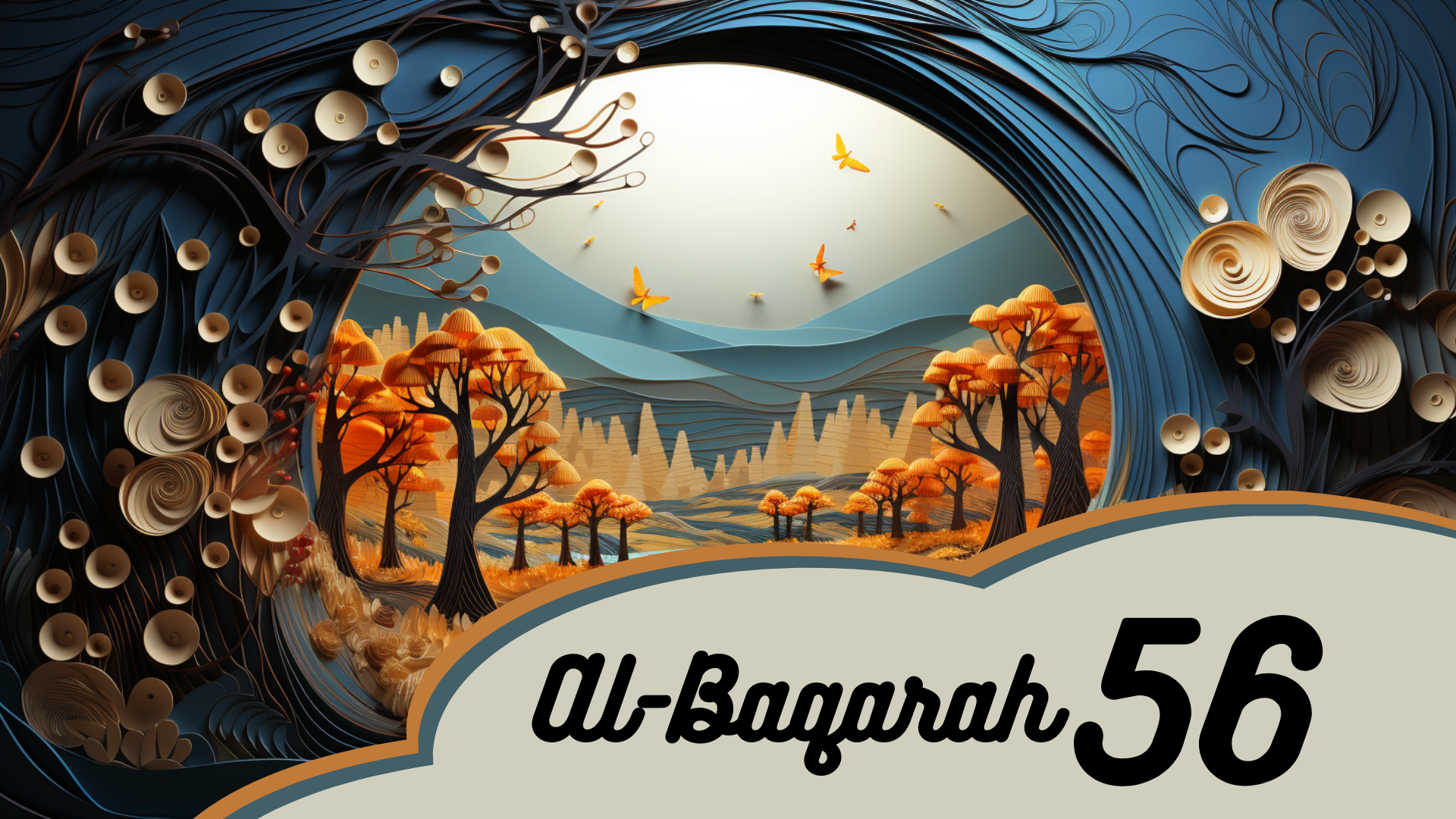In this article, we explore the profound significance of Verse 56 of Surah Al-Baqarah from the Holy Quran. We delve into the rich layers of its meaning, uncovering its relevance and application in the daily lives of Muslims. Through a thorough examination of this verse, we gain a deeper understanding of its spiritual guidance and the lessons it imparts. Join us as we embark on this enlightening journey, uncovering the wisdom encapsulated within the words of Surah Al-Baqarah’s Verse 56.
Verse 56 of Surah Al-Baqarah
Literal meaning
The literal meaning of verse 56 of Surah Al-Baqarah is as follows:
“And [recall] when Moses prayed for water for his people, so We said, ‘Strike with your staff the stone.’ And there gushed forth from it twelve springs, and every people knew its watering place. ‘Eat and drink from the provision of Allah, and do not commit abuse on the earth, spreading corruption.'”
Contextual background
This verse is part of the larger narrative of the Israelites’ journey through the desert after their liberation from the oppression of Pharaoh in Egypt. It takes place after their escape and during their period of wandering in the wilderness. The Israelites, being a large community, were facing the challenge of finding water to sustain themselves in the arid desert environment.
Significance in the Qur’an
This verse holds great significance in the Qur’an as it highlights a miraculous event where Prophet Moses, upon Allah’s command, struck a stone with his staff, resulting in twelve springs gushing forth to provide water for the Israelites. This event demonstrates the power and divine intervention of Allah in responding to the Prophet’s supplication and meeting the needs of His people.
Understanding the message
The message conveyed by this verse is multifaceted. Firstly, it emphasizes the role of the Prophets as mediators between Allah and His creation. Moses, being a Prophet, prayed to Allah on behalf of his people, and Allah responded to his prayer with a miraculous solution to their need for water.
Additionally, this verse serves as a reminder of Allah’s ability to provide sustenance, even in the most challenging circumstances. The stone, when struck by Moses, unleashed a source of water that not only quenched the thirst of the Israelites but also satisfied their individual needs with twelve distinct springs, ensuring equitable distribution among the different tribes.
The concept of religious guidance
Verse 56 of Surah Al-Baqarah also emphasizes the concept of religious guidance. Through Prophet Moses’ prayer, Allah guided the Israelites to a source of water that would sustain them in the desert. This highlights the significance of seeking and following divine guidance in navigating through life’s challenges.
Just as the Israelites relied on the guidance of their Prophet, Muslims today are encouraged to seek guidance from the Qur’an and the teachings of Prophet Muhammad. Allah’s guidance provides the necessary tools and principles to lead a righteous and fulfilling life.
The importance of gratitude
An essential lesson from this verse is the importance of gratitude. After providing water for the Israelites, Allah instructs them to “eat and drink from the provision of Allah.” This serves as a reminder to be grateful for the blessings bestowed upon us by Allah, recognizing that all sustenance, whether material or spiritual, comes from Him.
Gratitude is a fundamental aspect of Islamic faith. Muslims are encouraged to develop a mindset of gratitude, acknowledging Allah’s blessings and expressing gratitude through words and actions. The water provided to the Israelites serves as a symbol of the countless blessings we receive from Allah daily.
The relationship between worship and guidance
Verse 56 also highlights the intimate relationship between worship and guidance. When the Israelites were in need of water, it was through the act of prayer that Prophet Moses sought Allah’s intervention. By striking the stone with his staff, Moses not only fulfilled a physical necessity but also reaffirmed the importance of turning to Allah in times of need.
This verse emphasizes that guidance and solutions to our problems can be found through sincere worship and supplication to Allah. It serves as a reminder to Muslims that when faced with challenges, they should turn to Allah in prayer and seek His guidance, just as Prophet Moses did.
Implications for daily life
The message of verse 56 of Surah Al-Baqarah holds significant implications for Muslims in their daily lives. Firstly, it serves as a reminder to rely on Allah and seek His guidance when facing difficulties. Whether it be personal struggles or societal challenges, Muslims are encouraged to turn to Allah in prayer, trusting in His wisdom and ability to provide solutions.
Secondly, this verse emphasizes the importance of gratitude in daily life. Gratefulness cultivates humility and contentment, reminding Muslims to appreciate the blessings they have been given and to share those blessings with others. Muslim individuals and communities are reminded to express gratitude and utilize their resources in a responsible and mindful manner, avoiding wastefulness and abuse.
Promoting an attitude of gratitude
Verse 56 of Surah Al-Baqarah encourages Muslims to cultivate an attitude of gratitude in their daily lives. By recognizing that all provisions are from Allah, individuals are reminded to express gratitude not only through words but through actions as well. Muslims should actively strive to be thankful for the blessings they enjoy, such as health, sustenance, and the guidance of Islam.
Promoting gratitude within families and communities fosters a positive and harmonious environment. By expressing gratitude, individuals uplift one another and strengthen their relationships. It also helps cultivate a sense of contentment and reduces the tendency to compare oneself with others, thereby fostering a greater appreciation for the unique blessings bestowed upon each individual.
Seeking guidance through worship
Finally, the verse underscores the significance of seeking guidance through worship. Muslims are encouraged to establish a connection with Allah, not only during times of difficulty but also in times of ease. Engaging in acts of worship, such as prayer, recitation of the Qur’an, and reflection, opens the door for Allah’s guidance and blessings.
Seeking guidance through worship enables Muslims to navigate life’s challenges with a sense of purpose and direction. It provides them with the strength and clarity of mind to make sound decisions and maintain a righteous path. Through a consistent and sincere practice of worship, individuals are more likely to experience Allah’s guidance, leading to increased tranquility and success in all aspects of life.
In conclusion, verse 56 of Surah Al-Baqarah holds immense significance in the Qur’an and offers valuable lessons for Muslims. It emphasizes the role of Prophets as intercessors between Allah and His creation, highlights the concept of religious guidance, and underscores the importance of gratitude and worship in seeking Allah’s assistance and blessings. By embracing these teachings and applying them in their daily lives, Muslims can deepen their spirituality and experience a greater sense of fulfillment and purpose.




